Year: 2019
EPA Call 2019 & 2020 Documents (Now Closed)
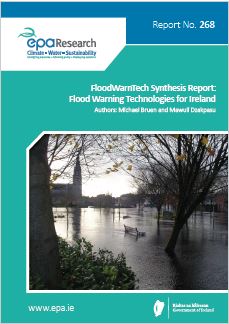
Authors: Michael Bruen and Mawuli Dzakpasu, April 2019
Year: 2019
FloodWarnTech was an Environmental Protection Agency (EPA)-funded desk study of flood warning, with a specific focus on Ireland. Its objectives were to investigate (1) flood forecasting techniques and systems in use in Ireland and elsewhere; (2) methods and models best suited for use in Ireland; and (3) the optimal use of relevant data sources, observations and forecasts for flood forecasting.
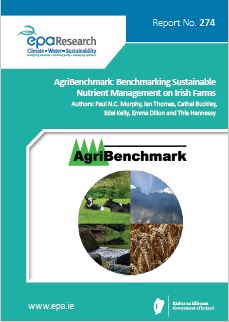
Authors: Paul N.C. Murphy, Ian Thomas, Cathal Buckley, Edel Kelly, Emma Dillon and Thia Hennessy, April 2019
Year: 2019
AgriBenchmark explored the possibilities for benchmarking of nutrient management performance on Irish farms. Teagasc National Farm Survey (NFS) data (2008–2015; 1446 farms) was used to characterise and explore the potential for improvement of farm nutrient management performance and resultant aspects of environmental and economic sustainability through the derivation of three key performance indicators.
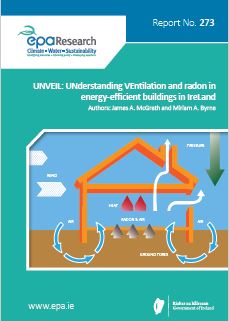
Authors: James A. McGrath and Miriam A. Byrne , April 2019
Year: 2019
In Ireland, radon gas is considered the greatest source of radiation exposure to the general population, accounting for just over 55% of the average radiation dose and is recognised as the second leading cause of lung cancer after tobacco smoke. Each year in Ireland, exposure to radon is linked to approximately 250 cases of lung cancer.
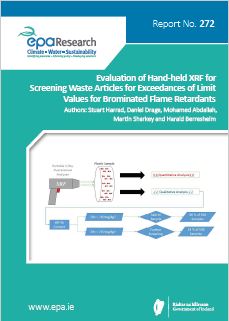
Authors: Stuart Harrad, Daniel Drage, Mohamed Abdallah, Martin Sharkey and Harald Berresheim , March 2019
Year: 2019
Recent research has demonstrated the presence of restricted persistent organic pollutant (POP) brominated flame retardants (BFRs) in items such as children’s toys and food contact articles. As the presence of these contaminants in such items serves no useful purpose, they are thought to originate from the use of recycled plastics that were originally treated with BFRs.
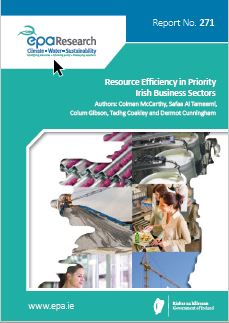
Authors: Colman McCarthy, Safaa Al Tameemi, Colum Gibson, Tadhg Coakley and Dermot Cunningham , March 2019
Year: 2019
The purpose of this desk study was to identify and examine the most important manufacturing and service sectors from environmental and economic perspectives and from the perspective of potential for improvement in resource efficiency.
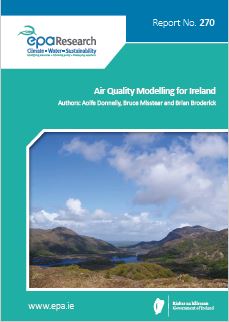
Authors: Aoife Donnelly, Bruce Misstear and Brian Broderick, March 2019
Year: 2019
Air pollution is the primary environmental cause of premature death in the EU (EC, 2013) and the most problematic pollutants across Europe have consistently been oxides of nitrogen [e.g. nitrogen dioxide (NO2)], particulate matter (e.g. PM10, PM2.5) and ozone (O3).
-thumbnail.jpg)
Authors: John Sodeau, David O’Connor, Patrick Feeney, Michael Quirke, Shane Daly, Mehael Fennelly, Paul Buckley, Stig Hellebust, Eoin McGillicuddy and John Wenger, February 2019
Year: 2019
This report presents a description of field and laboratory studies directed towards understanding the time behaviours of sources, removal pathways and number concentrations of airborne fungal spores and pollen.
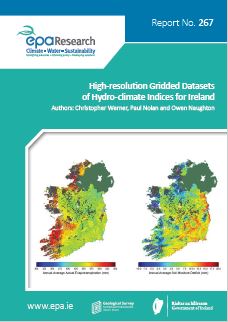
Authors: Christopher Werner, Paul Nolan and Owen Naughton, February 2019
Year: 2019
This report describes the application of numerical weather prediction (NWP) simulations to develop high-quality, long-term, gridded climate datasets of hydro-climate variables for Ireland, covering the period 1981–2016.
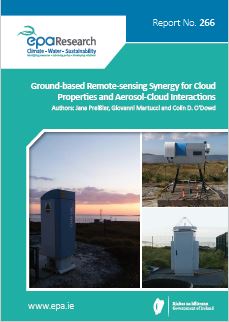
Authors: Jana Preißler, Giovanni Martucci and Colin D. O’Dowd, February 2019
Year: 2019
Clouds and aerosols play an important part in climate processes; however, their interactions are not well understood. To study the effect of both natural marine and anthropogenic aerosols on clouds and cloud optical properties we looked at a mix of information from remote-sensing and in situ instruments from more than 6 years.
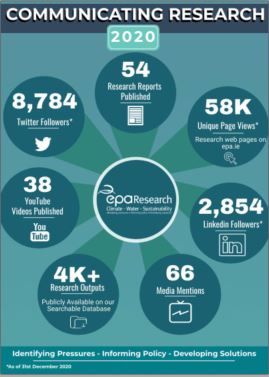
Year: 2019
Infographic showing communications activities in 2020
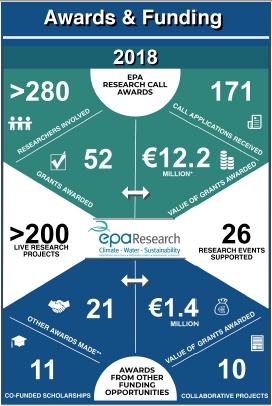
Year: 2019
This infographic gives information about the EPA Research Programme in 2018
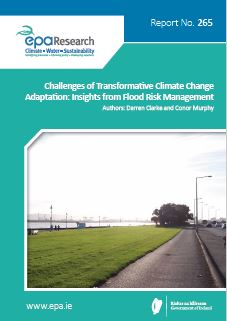
Authors: Darren Clarke and Conor Murphy., January 2019
Year: 2019
Increased attention is now being given to the need for transformative change in dealing with flood risks. This report addresses the lack of knowledge about the challenges associated with attempting transformative change, by drawing on findings from 11 flood risk management case studies across four European countries (Austria, France, Ireland and the Netherlands).
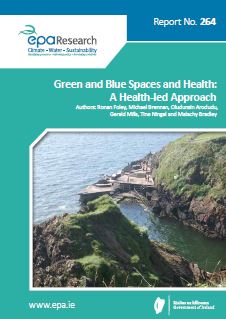
Authors: Ronan Foley, Michael Brennan, Oludunsin Arodudu, Gerald Mills, Tine Ningal and Malachy Bradley., November 2018
Year: 2018
This research was based on a 12-month desk study that modelled, for identified sample sites, the relationships between health indicators and the availability of green and blue infrastructure (GBI). It provided a route to identify measurable effects and results from a cross-sectional and area-based study.
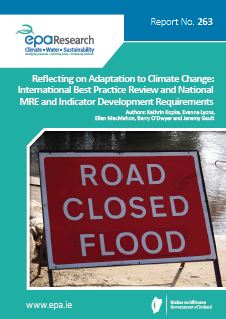
Authors: Kathrin Kopke, Evanna Lyons, Ellen MacMahon, Barry O’Dwyer and Jeremy Gault., November 2018
Year: 2018
Adaptation Preparedness Indicators for Ireland aims to identify draft adaptation indicator sets. The project carried out a review of international best practice to ascertain criteria and constraints relevant to adaptation indicator development in Ireland.
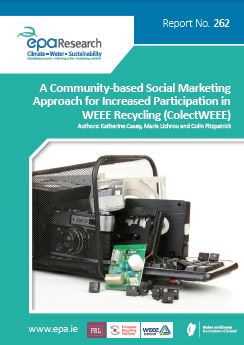
Authors: Katherine Casey, Maria Lichrou and Colin Fitzpatrick, November 2018
Year: 2018
This study explored human behaviour in relation to small WEEE recycling through 26 in-depth interviews with 30 participants; observations and casual conversations at a civic amenity site and waste collection event; and participant observation at 25 retailers. The study proposes a multi-pronged approach to social marketing campaigns with the aim of increasing participation in small WEEE recycling.
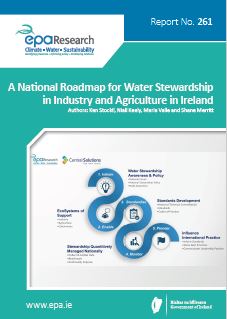
Authors: Ken Stockil, Niall Keely, Maria Valle and Shane Merritt, October 2018
Year: 2018
Following extensive desk research and a process of national and international consultation, this report captures key lessons for Ireland in relation to water stewardship and outlines an integrated roadmap towards establishing the country as a leader in the adoption of water stewardship best practice at both national and local levels in the years ahead.
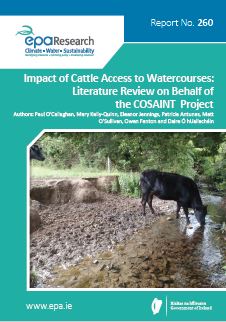
Authors: Paul O’Callaghan, Mary Kelly-Quinn, Eleanor Jennings, Patricia Antunes, Matt O’Sullivan, Owen Fenton and Daire Ó hUallacháin., October 2018
Year: 2018
The primary objective of this literature review was to collate and assess the available literature on the environmental impact of cattle access to watercourses, with an emphasis on empirical research that is directly relevant to the environmental effects.
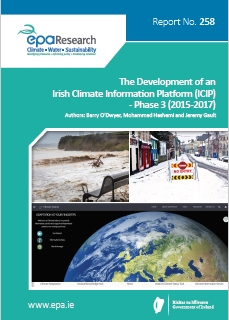
Authors: Barry O’Dwyer, Mohammad Hashemi and Jeremy Gault, September 2018
Year: 2018
The global climate is changing as a result of human influences; the impacts of these changes are already being felt across all continents and oceans and are expected to continue and intensify for many decades to come.
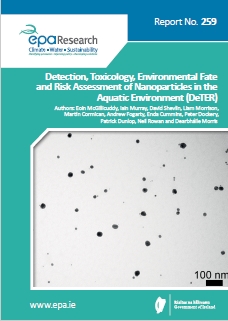
Authors: Eoin McGillicuddy, Iain Murray, David Shevlin, Liam Morrison, Martin Cormican, Andrew Fogarty, Enda Cummins, Peter Dockery, Patrick Dunlop, Neil Rowan and Dearbháile Morris, September 2018
Year: 2018
Nanotechnology is an emerging technology that has the potential to impact on all aspects of life and the economy and is expected to form the basis of several technological innovations and advances in the 21st century.